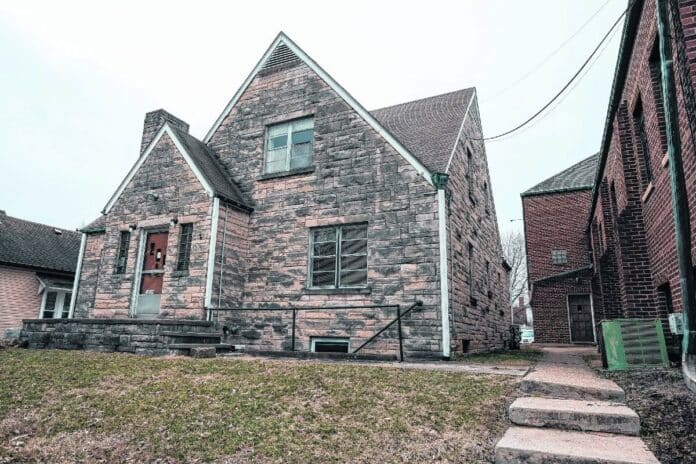
A former church parsonage in Columbus that has been transformed into a recovery home for men seeking help for substance use disorder has opened, becoming the first recovery house in the county.
The 2,300-square-foot facility, called the Chain Breaker House, 1218 California St., officially opened Thursday and two residents who were previously living at similar facilities in Indianapolis have moved into the house to continue their treatment, said Mark Hadley, assistant intake manager at Chain Breaker Ministries, a nonprofit organization formed by concerned Columbus-area Christians who operate the house.
The house can house up to six men struggling with alcohol or drug abuse issues and has two bedrooms, study areas, a kitchen, living room and finished basement, organizers said.
Two staff members will live there round the clock starting in the summer, said Charles Dillard, program director. Dillard and Hadley, who have both been through the faith-based treatment program themselves, are currently living in the house full time in the interim.
[sc:text-divider text-divider-title=”Story continues below gallery” ]Click here to purchase photos from this gallery
The two men currently undergoing treatment are staying in one bedroom on the second floor, a room with three sets of bunk beds. The study areas, also on the second floor, are for residents to write in their journals and study program material.
The finished basement, which has with blue walls, includes furniture, a fireplace, stereo system and ping pong, air hockey and foosball tables.
Some weight-training equipment lay disassembled on the floor along one of the walls.
Dillard said he expects to fill the remaining four slots at Chain Breaker House in the next few weeks.
“We’re excited to be coming into the community,” Dillard said. “…This is just the beginning of what I believe is going to be something bigger here in Columbus.”
Faith-based treatment
The Chain Breaker Ministries program, which is a joint effort with the Indianapolis-based Wheeler Mission, is a faith-based treatment program largely based on biblical teachings, but participants are not required to convert to Christianity, Hadley said.
Faith-based drug treatment programs aim to address a recovering individual’s medical and spiritual needs, much like Narcotics Anonymous and Alcoholics Anonymous, according to Addiction Center, an online guide for people struggling with substance use disorders and other issues.
The Chain Breaker Ministries program, which lasts six to eight weeks, does not support medication-assisted treatment at this time, which is the combination of medications approved by the U.S. Food and Drug Administration and counseling and cognitive behavioral therapy, including individual or group counseling, family therapy or referrals to other services in the community, according to the National Institute on Drug Abuse.
“Without having medical staff, you just can’t do it,” Dillard said.
Instead, the Chain Breaker House preaches drug abstinence, behavioral therapy and life skills informed by the Bible, Dillard said.
Faith-based treatment programs, however, are not the only operating models for recovery housing, said Doug Leonard, executive director of the Alliance for Substance Abuse Progress (ASAP), in a previous interview.
“We’d be thrilled to see a variety of different models here,” Leonard said. “We embrace all of them because each one can serve somebody who might not do well in the others.”
After the six to eight weeks at Chain Breaker House, residents are moved to a 72-person, 285-acre camp in Bloomington, called Camp Hunt, where participants stay around six months and can receive visitations from their family, Hadley said.
After staying at the camp, participants can go into a three-month program to help them find work and reintegrate into society or another nine-month program to be trained in “Biblical counseling” and drug and alcohol certification classes to be on staff at facilities like Chain Breaker House.
Kenneth Griggs, 37, an Oregon native who had been residing in Seymour and North Vernon before joining the program, and Toby Marsh, 37, of Scipio moved into the house Thursday to continue their treatment.
Griggs, who described himself as an “addict” who used drugs “to run from core issues,” said the program has been beneficial so far.
“As far as the whole experience, the beauty of it is we’ve all been through this and we can relate with each other,” Griggs said. “…I’m not going to say it’s all a bed of roses, but we have to fight through the issues that we got. Each day it becomes easier.”
March entered the program on Feb. 10 in Indianapolis after Hadley picked him up from Bartholomew County Jail, where he said he was serving time for possession of methamphetamine.
At Chain Breaker House, the residents have very limited access to television, no access to cell phones and no visitations are allowed. But Marsh said he excited about going to Camp Hunt, where visitations with immediate family are allowed, so he can see his wife and three children.
Marsh said he has two daughters ages 17 and 13 and a son who is 15 years old. He said he has not seen his children or wife since being incarcerated in October last year.
“I’m just grateful to get the chance to get the help to turn my life around and get back to my kids and my wife,” Marsh said. “I’m excited about going to camp because I’ll get to see my kids and my wife. …I’m ready, I’m excited. I can’t wait to see my kids.”
Bridging gaps
Officials at ASAP and other organizations have identified the lack of recovery housing in Bartholomew County as a critical gap in the community-wide effort to help people overcome substance use disorder.
Leonard has said he is hopeful that four to six recovery residences will be operating in Bartholomew County by the end of the year.
Before Thursday, the closest recovery housing for men was in Jennings County, said ASAP Hub Director Nathan Walsh. Currently, the closest recovery housing for Bartholomew County women is in Monroe County.
“It’s a huge deal,” Walsh said when asked about the opening of the Chain Breaker House. “We’ve had zero recovery housing in the community forever. To actually get this started and actually get the program up and running is fantastic. We hope this will be the first of several (recovery housing options) to open up this year.”
However, Bartholomew County could see recovery housing options become available for women in the coming weeks, as workers continue renovating a downtown Columbus building that will become an addiction recovery center for expectant and new mothers.
The facility, called the Fresh Start Recovery Center, 703 Washington St., will have 11 resident rooms, seven activity areas, a treatment room, a medical office and a capacity for 25 women, said Amanda Hall, senior vice president of operations of behavioral health at Volunteers of America, a nonprofit, faith-based organization that will oversee the facility.
The facility is expected to open as soon as April.
“Hopefully, this is the first of many (recovery houses),” Walsh said.
[sc:pullout-title pullout-title=”Where to learn more” ][sc:pullout-text-begin]
Visit www.chainbreakerministries.org for more information about the Chain Breaker House.
[sc:pullout-text-end]




